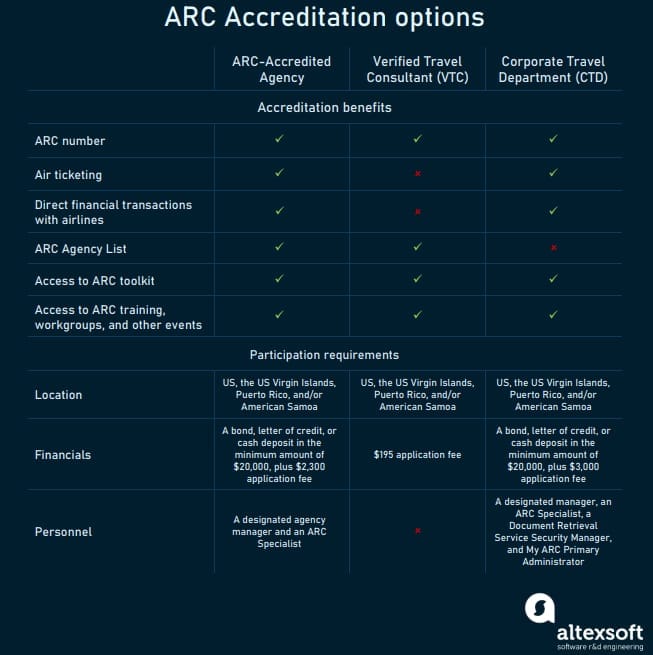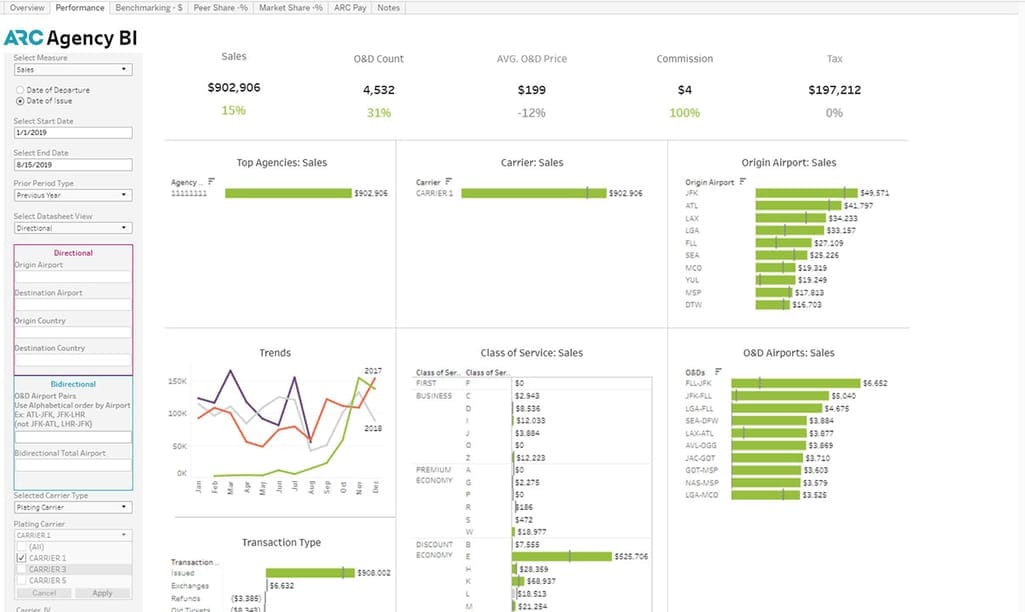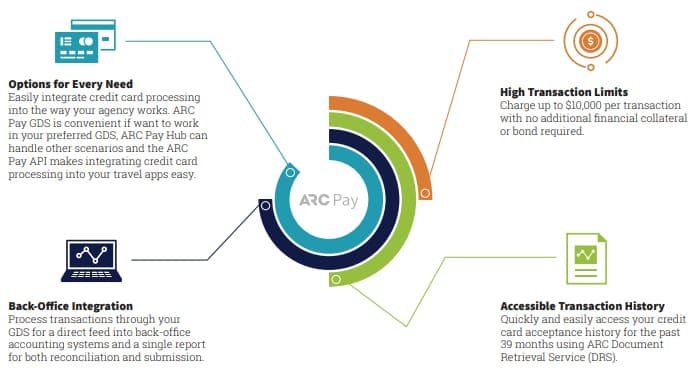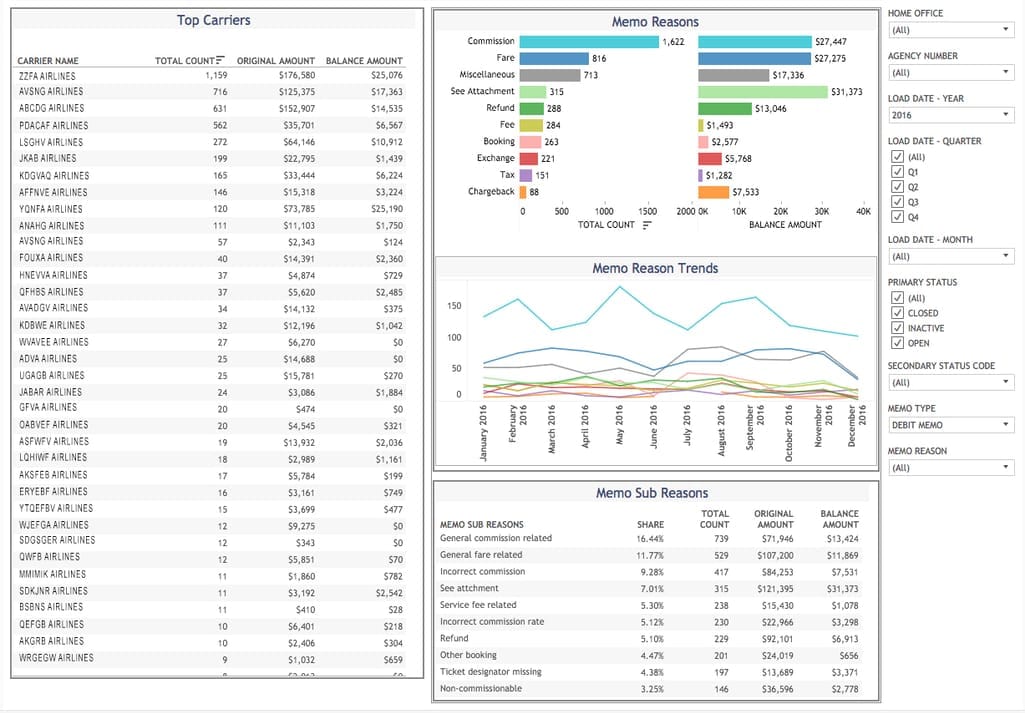Our detailed guide on IATA accreditation will provide a comprehensive roadmap of the travel agency accreditation process, its main concepts, and the parties involved in it. There’s also an article about booking and ticketing for non-IATA agencies that describes other ways to sell flights. This time, we'll focus on the ARC, what it is, how and why you can get certified, and what other options exist.
What is ARC?
So, ARC or Airline Reporting Corporation is a company that regulates and handles transactions between airlines and US-based travel agencies. It was established in 1984 as a successor to the Air Traffic Conference of America, formerly known as the Air Transport Association of America (ATA).Today, it’s owned by nine major airlines and partners with almost 400 airlines. Besides ticket transaction settlement services, it also accredits travel agencies and provides access to the aggregated air transaction data.

Airline sales summary 2019, source: ARC
Here, a main source of confusion is the difference between ARC and IATA. In short, IATA’s role and range of responsibilities in the travel sector are much broader as it formulates the industry policy and standards. It also provides certification services to travel agencies worldwide, while ARC works solely with agents located in the USA, Puerto Rico, the US Virgin Islands, and American Samoa.With that clarification, the next question is, what can ARC accreditation bring to your travel business?
Why get ARC accreditation?
The accreditation process requires time and effort. So before you start, you want to clearly understand what you’re getting in the end.Issuing air tickets
Probably, the most important benefit of ARC accreditation is the ability to issue airline tickets.In short, the process of flight reservation involves two stages: booking and ticketing. To complete the booking, you need to access one of the GDSs or airlines, get flight information, and create a Passenger Name Record (PNR). Then, the payment takes place after which the airline approves the transaction, reserves the seat, and completes the reservation process.


The flight booking algorithm explained
The problem is that airlines won’t just let anybody sell their seats haphazardly, so partnering with accredited agents basically guarantees airlines that they will get paid.
With ARC, you’ll be able to seamlessly book tickets directly from airlines or through GDSs. However, note that not all types of ARC accreditation give the ticketing power (with the VTC option, you can’t issue tickets yourself).
Recognition and credibility
Another crucial reason for getting the ARC accreditation number is industry recognition. Once you get an ARC unique ID number, you are included on the ARC’s Agency List, recognized by travel professionals industrywide.
Since the accreditation is basically a validation of your legal status and clean background, it’s a sign of credibility and trustworthiness for all your suppliers and other partners. This credential eliminates the need for additional checks, saves time and effort, and simplifies the collaboration.
Access to data, tools, and events
Today, data collection and analytics are the main support for business development. ARC uses modern technologies to gather travel data and offers a number of solutions to support travel agencies’ business intelligence, analytics, and reporting processes. With its tools, you can monitor your own performance, compare it to your competitors', and view industry trends. We’ll describe available products a bit further on.
Besides, once you participate with ARC, you can also take part in industry conferences, working groups, webinars, and other events that enable you to keep up to date and improve your business.
ARC accreditation requirements and process
Now that you have an idea of the perks that come with ARC accreditation, it’s time to learn about how to get them. ARC has three types of accreditation.
ARC accreditation types comparison
ARC Accredited Agency (Full accreditation): for selling air tickets
It’s the main accreditation type and the one that enables travel agencies to issue airline tickets. To be eligible for full ARC accreditation, you have to meet the following requirements:
- Location -- your agency has to be registered and authorized to do business activity in the United States, the US Virgin Islands, Puerto Rico, and/or American Samoa.
- Financials -- you’ll have to provide a bond, letter of credit, or cash deposit in the minimum amount of $20,000. There’s also a $2,300 application fee to be paid.
- Personnel -- there must be a designated agency manager and an ARC Specialist in your office (it can be the same person). To become an ARC Specialist, you must pass the ARC Specialist Training and Certification Program and then pass the examination. ARC also requires all staff members involved in daily agency operations be US citizens or be authorized to work in the US.
- Documents -- you’ll have to provide entity papers, an Employer ID Number, and any licenses for local jurisdictions.
For more details, check the Industry Agents' Handbook (IAH). It contains all the industry-related instructions and rules and will assist you in your daily operations.
Once the requirements are met, the application process is fairly simple.
- Review the eligibility criteria and the Agent Reporting Agreement (ARA). It's basically the contract between your agency and ARC that delineates your partnership and outlines the rights and obligations of parties.
- Complete the application form (that would include your personal and professional history and background).
- Submit your application, payment, and all the required supporting documents. You can send them via email or via US mail.
- Wait for the application to be reviewed and documentation verified. It usually takes about 10 days.
- Pass an interview. An ARC specialist will contact you to schedule an in-person interview at your agency.
The whole application process can take up to 90 days before you are notified of the final decision. Here’s the FAQs on the application process for more information.
ARC Verified Travel Consultant (VTC): for non-ticketing travel professionals
ARC has a non-ticketing accreditation option -- VTC. It provides all other participation benefits (such as industry recognition and access to the ARC toolkit) except for the ability to issue airline tickets. So, it’s well worth considering, if you can partner with a consolidator or a host travel agency that would take charge of ticketing.
VTC is also a lot cheaper and there are fewer requirements -- basically, you only need to be US-based. Here’s what you have to do to become an ARC VTC.
- Review the VTC Agreement and IAH.
- Download and complete the application form.
- Submit the application form together with supporting documents and pay the $195 application fee.
- Wait for verification (may take up to 30 days).
Check the VTC FAQs to learn more about the VTC program.
ARC Corporate Travel Department (CTD): for big non-travel businesses
A study shows that US companies spend over $111.7 billion on business travel every year, so having an in-house travel program is an effective solution to managing corporate travel expenses.
The ARC CTD is designed not for travel agencies, but for corporations to help their travel departments manage their relationships with travel product suppliers. It can be useful for businesses that regularly book travel services for their employees (for example, international consulting companies or ones that frequently take part in trade shows, conferences, and other industry events).
Basically, with CTD accreditation, corporations act as travel agents and book directly with GDSs and airlines. They can also outsource the ticketing activities to a third party, i.e., a travel management company. In any case, such accreditation eliminates extra mediators, allows corporations to save on travel agents’ commissions, and simplifies the booking, billing, and bookkeeping process.
The participation requirements are not unlike those for full accreditation:
- Location — the US, the US Virgin Islands, Puerto Rico, and/or American Samoa;
- Financials — a bond, letter of credit, or cash deposit of at least $20,000 plus a $3,000 application fee;
- Personnel — one or several employees combining the roles of a designated manager, an ARC Specialist, a Document Retrieval Service (DRS) Security Manager, and My ARC Primary Administrator;
- Documentation — all legal documents, including IRS Employer Identification Number (EIN); and
- Security standards for handling paper documents — as described in Section B of the Industry Agents' Handbook (IAH).
The application process is also straightforward and similar to the one we described above.
- Review the requirements and the Corporate Travel Department Reporting Agreement (CTDRA).
- Complete the application form (including a completed Personal History Form for one corporate officer involved with the CTD).
- Submit your application, payment, and all the required supporting documents.
- Wait for the application to be reviewed and documentation verified.
- Pass an in-person interview at your corporation.
The whole application process can take up to 90 days. If you want to know more, here’s a CTD FAQs.
ARC toolkit
Joining ARC provides access to a range of products and services that support transaction management, reporting, and analytics. They are available through My ARC account, the main management portal for ARC members.
Interactive Agent Reporting (IAR) is an electronic sales reporting system that simplifies the settlement process by capturing and storing all transaction data. It allows for managing transactions, performing refunds, and creating sales reports.
Document Retrieval Service (DRS) is a record-keeping system for storing more than three years of IAR-reported ticketing data.
Internet Sales Summary (ISS) is a consolidated report of the settled sales (transactions data for 2 years is accessible).
Agency BI is a solution for monitoring your performance, benchmarking, and viewing analytics results.
ARC Agency BI interface
Aria is another business intelligence tool for viewing and analyzing sales activities through a variety of metrics. You can either access information online, or download a raw data file. By analyzing ARC ticketing data, Aria helps detect passenger patterns and main destinations of interest.
ARC Pay is a credit card processing service that simplifies handling travel-related transactions. It includes
- ARC Pay GDS (formerly TASF) to process payments within GDSs,
- ARC Payment Hub (formerly Agent’s Choice) for non-GDS transactions, and
- ARC Pay with Uplift to offer the buy now, pay later option.
We have an article that gives more details on payment workflows in ARC, if you are interested.
There's also the ARC Pay API service that functions over HTTPS protocol and allows for processing transactions completely outside of the GDS. This extension is developed to help third-party aggregators “streamline payments activity through custom software or through other channels like web, mobile, or even NDC platforms.”
ARC Pay
Memo Manager is a tool for automating memo exchange and processing. It also streamlines communication between agencies and airlines that simplifies resolving memo issues.
Memo Analyzer for Agencies visualizes Memo Manager information for further analysis.
Memo Analyzer for Agencies dashboard
ARC vs IATAN accreditation: why and when you need both
IATAN, or International Airlines Travel Agent Network, is a department of IATA and provides the same services, but for US-located travel businesses only. It also certifies travel agencies, but the trick here is that to be accredited with IATAN, you first need to have an ARC accreditation. Moreover, the agency code number provided by IATAN would be exactly the same as your ARC number.
So you might be wondering what’s the point of going through another hassle of getting the IATAN accreditation. Well, long story short, there are two reasons. First, being with IATAN still brings with it a certain status and industry recognition. And second, some travel suppliers offer discounts to the IATAN ID cardholders.
That’s why many ARC-certified agencies also get and maintain IATAN accreditation. Here, we’re not going to dive into procedure details as we’ve already described the accreditation process for IATAN in a dedicated article.
Other options: business without ARC
ARC accreditation offers travel agencies a number of benefits. However, it’s not the only way of running a travel business. For example, if you are a new company and can’t afford to obtain this credential, or maybe you don’t plan to sell air -- here are some other options.
Host agencies. A host travel agency is usually a well-developed company that has the sought-for credentials and shares them with other agents, allowing them to work under its umbrella. Such a relationship can save you the time and effort of getting your own certification, but in exchange you’ll have to split the commission you’re getting as an agent.
Consolidators. In the travel industry, consolidators are wholesalers that buy tickets in bulk and then resell them for higher fares. Such companies usually have all the recognized accreditations and established connections with major suppliers, so partnering with them would open access to discounted fares as well as GDSs and other travel products suppliers.
Non-flight travel markets. If your business focuses on managing travel that doesn’t involve issuing air tickets, you can totally do without the ARC certificate. Arranging city tours, booking cruises, or organizing mountain hikes are just some of the possible ideas.
